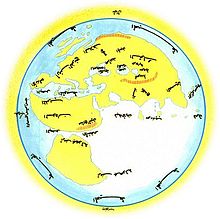al-Masudi
[8] Towards the end of The Meadows of Gold, al-Masʿudi wrote: The information we have gathered here is the fruit of long years of research and painful efforts of our voyages and journeys across the East and the West, and of the various nations that lie beyond the regions of Islam.The author of this work compares himself to a man who, having found pearls of all kinds and colours, gathers them together into a necklace and makes them into an ornament that its possessor guards with great care.Early in the Abbasid era the art of papermaking was brought to the Islamic world by Chinese prisoners after the battle of Talas and most large towns and cities had paper mills.The high literacy and vigor of the Islamic world with its rich cultural heritage of Greek philosophy, Persian literature, Indian mathematics, contrasted with that of Europe, when the author of the Anglo-Saxon Chronicle was writing.Islamic Abbasid society of al-Masʿudi's world manifested a knowledge seeking, perceptive analytical attitude and scholarly-minded people associated naturally in this highly civilized atmosphere.He met Zahirites in Baghdad and Aleppo such as Ibn Jabir and Niftawayh; modern scholarship leans toward the view that al-Mas'udi was an adherent of the latter school.[13] Al-Masʿudi knew leading Mu'tazilites, including al-Jubba, al-Nawbakhti, ibn Abdak al-Jurjani and Abu'l-Qasim al-Balkhi al-Ka'bi.He also was well-aware of the mixture of interesting facts in pre-Islamic times, in myths and controversial details from competing tribes and even referred to the similarity between some of this material and the legendary and story telling contributions of some Middle Persian and Indian books to the Thousand and One Nights.His normal inquiries of travelers and extensive reading of previous writers were supplemented in the case of India with his personal experiences in the western part of the subcontinent.He described previous rulers in China, underlined the importance of the revolt by Huang Chao in the late Tang dynasty, and mentioned, though less detailed than for India, Chinese beliefs.He surveyed the vast areas inhabited by Turkic peoples, commenting on what had been the extensive authority of the Khaqan, though this was no longer the case by al-Mas'udi's time.One example of al-Masʿudi's influence on Muslim knowledge of the Byzantine world is that the use of the name Istanbul (in place of Constantinople) can be traced to his writings during the year 947, centuries before the eventual Ottoman use of this term.In general his surviving works reveal an intensely curious mind, a universalist eagerly acquiring as extensive a background of the entire world as possible.There is in the world, and God alone knows it, no place where more frequent use is made of the winds"Lunde and Stone have provided the English reader with a fluent translation of some three-quarters of al-Masʿudi's material on the Abbasids from the Murūj al-dhahab.The poet on two separate occasions recites praise poems for the defeated Umayyads to the Abbasid caliph; al-Mansur good naturedly rewards him.of the arrow that landed at al-Mansur’s feet with verses inscribed in each of the three feathers and along the shaft causing him to investigate the unjust imprisonment of a distinguished notable from Hamadan.One of the more interesting passages is the account of the symposium held at the home of Harun al-Rashid's famous vizier Yahya the Barmakid on the topic of love.Kitāb al-Tanbīh wa’l-Ishrāf (كتاب التنبیه والأشراف), ‘Book of Admonition and Revision’; an abridged Murūj al-Dhahab, about one-fifth its length, containing new material on the Byzantines, that al-Mas'udi wrote shortly before his death.He also met Zahirites in Baghdad and Aleppo such as Ibn Jabir and Niftawayh; modern scholarship leans toward the view that al-Mas'udi was an adherent of the latter school.
Masudi (disambiguation)Naturhistorisches MuseumBaghdadAbbasid CaliphateJumada al-Thanial-Shafi'iIslamic golden ageMiddle Abbasid eraHistorygeographyjurisprudenceMurūj al-Dhahab wa-Ma'ādin al-JawharhistoriangeographertravelerHerodotuspolymathnatural sciencephilosophyThe Meadows of GoldAbdullah Ibn Mas'udIslamic prophetMuhammadHudhayl tribePersianArmeniaGeorgiaCaspian SeaArabiaIndus ValleySri LankaAbu Zayd al-SirafiLeo of TripoliClovisLouis IVAndalusianAbbasid eraprisonersbattle of TalasAnglo-Saxon ChronicleIbn DuraidNiftawayhAleppoal-Kindial-RaziAristotelianal-FarabiPlatonicPtolemaic astronomyal-SubkiShafi'iteZahiritesMu'tazilitesAssyriansBabyloniansUrartuSemiramisArmeniansAra the Beautifulibn al-MuqaffaMiddle PersianZoroastrianAchaemenid dynastyCyrus the GreatAlexander the GreatArdashiral-TabariMacedonianCaesarfounding mythRomulus and Remuspre-SocraticsThousand and One NightsOld WorldByzantine EmpireMuslims and Hindusrulers in ChinaHuang ChaoTang dynastyTurkic peoplesKhaqanKhazarsMuslimComorosRussian historyhistory of UkraineIbn KhordadbehIbn al-Faqihibn RustahIbn Fadlantheir paganismBlack SeaByzantine affairsBulgarsByzantine worldIstanbulConstantinopleGreeksArabic scriptBritainAnglo-Saxon EnglandFrankishlist of Frankish rulersVikingsWest AfricaZagawaal-MansurUmayyadsHarun al-RashidYahya the BarmakidBarbier de MeynardPavet de CourteilleSociete AsiatiqueCharles PellatErnest RenanPausaniasPliny the ElderIbn HajarAdh-DhahabiList of pre-modern Arab scientists and scholarsYahya ibn UmarTer-Ghevondyan, Aram N.Armenian Academy of SciencesJohn L. EspositoDevin J. StewartLeuven
